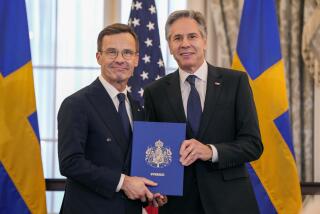NATO opens membership door to Serbia and Bosnia
- Share via
RIGA, LATVIA — NATO leaders concluded a two-day summit Wednesday by renewing their commitment to help build a stable democracy in Afghanistan and announcing steps toward welcoming as many as eight more former communist states into the alliance.
In a surprise move, the leaders invited Serbia, Montenegro and Bosnia-Herzegovina to join the Partnership for Peace program, a step toward membership that also signals an intent to build warmer relations.
It marked a reversal for the North Atlantic Treaty Organization, which had previously demanded that Serbia and Bosnia first show greater cooperation in tracking down high-profile suspects accused of war crimes in the Balkan conflicts of the 1990s.
A final declaration from the gathering held out the prospect that invitations to join NATO could be issued to Albania, Croatia and Macedonia at the next alliance summit in 2008, if the nations can show they meet the required standards.
The declaration also stressed that the door to NATO membership remained open to Georgia and Ukraine. Both nations were part of the Soviet Union, as were summit host Latvia and its Baltic neighbors and fellow NATO members, Estonia and Lithuania.
Moving to boost the alliance’s fighting capacity in the face of a resurgence of the Taliban movement in some parts of Afghanistan, many countries in the 26-member organization agreed to reduce or eliminate restrictions on how their troops could be used there. Some members pledged to increase the number of troops, officials said.
Commitments made at the summit mean that of the 32,000 alliance soldiers in Afghanistan, about 26,000 can now be used more flexibly, NATO Secretary-General Jaap de Hoop Scheffer said at a news conference.
Alliance officials did not immediately announce which countries had promised troop increases or how big the increases would be.
Some reports said the additional troops would come from Poland, Bulgaria, Spain and Macedonia. All four nations, including nonmember Macedonia, have troops in Afghanistan.
President Bush, in a speech Tuesday at a university here, pushed for NATO members to commit greater resources to Afghanistan and allow more freedom in how commanders use the troops.
“Contributing to peace and stability in Afghanistan is NATO’s key priority,” says the summit declaration, which described the goal of the alliance and the Afghan people as “a stable, democratic and prosperous society, free from terrorism, narcotics and fear, providing for its own security and at peace with its neighbors.”
“There can be no security in Afghanistan without development, and no development without security,” it says.
Scheffer described the decision to invite Serbia and Bosnia into NATO’s Partnership for Peace program as a political decision that was not meant to undermine pressure on the countries to pursue war crimes suspects.
NATO is pushing the two Balkan nations to assist in arresting former Bosnian Serb political leader Radovan Karadzic and military commander Ratko Mladic, who were indicted by the United Nations tribunal in The Hague.
Although Scheffer did not elaborate on the reasons for the move, it was seen as a gesture of support for pro-Western democratic forces in parliamentary elections next month in Serbia. It also may have been intended to help compensate Serbia if the U.N. approves independence for the province of Kosovo next year, as seems probable.
“This will help bring the region more fully into the Euro-Atlantic partnership,” Scheffer said.
Serbian Foreign Minister Vuk Draskovic called the invitation “a clear message to the retrograde political forces in Serbia that there will be no return to the past.”
The reconciliatory move came less than eight years after NATO bombed Serbia for 78 days in response to its actions against ethnic Albanians in Kosovo.
Chief U.N. war crimes prosecutor Carla Del Ponte issued a statement expressing regret for the alliance’s gesture.
NATO also declared that with fresh troop commitments, its new rapid-reaction force is fully operational. The force is designed to field up to 25,000 troops within a few days.
The new resource pledges show that NATO members “are committed to the concept of a flexible, deployable, interoperable and sustainable force that includes land, sea and air elements and is ready to react quickly wherever needed by the alliance,” said U.S. Marine Gen. James L. Jones, NATO’s supreme allied commander.
*
More to Read
Sign up for Essential California
The most important California stories and recommendations in your inbox every morning.
You may occasionally receive promotional content from the Los Angeles Times.










